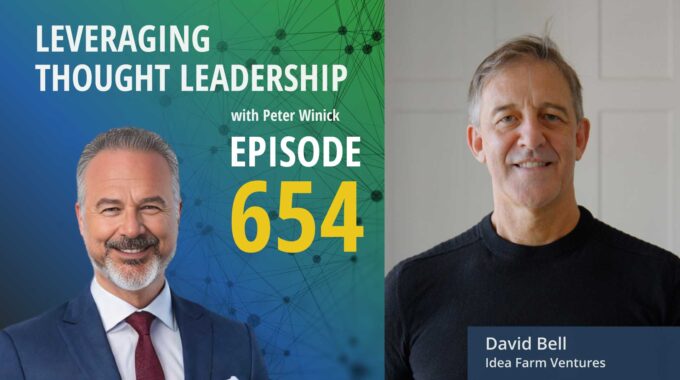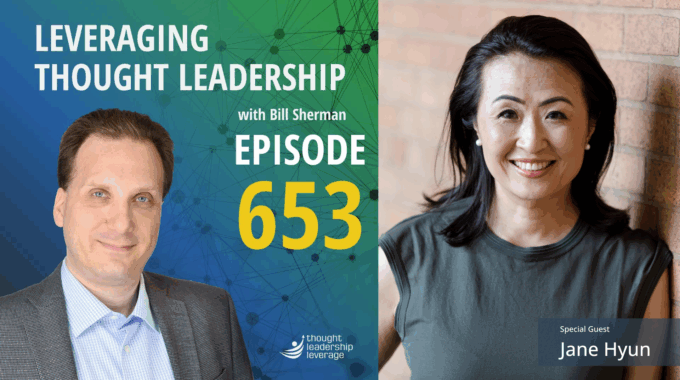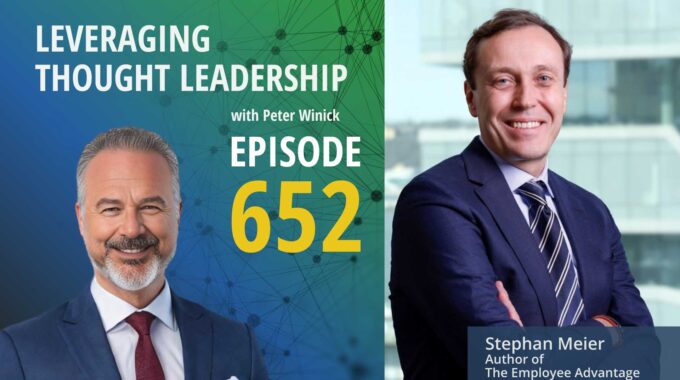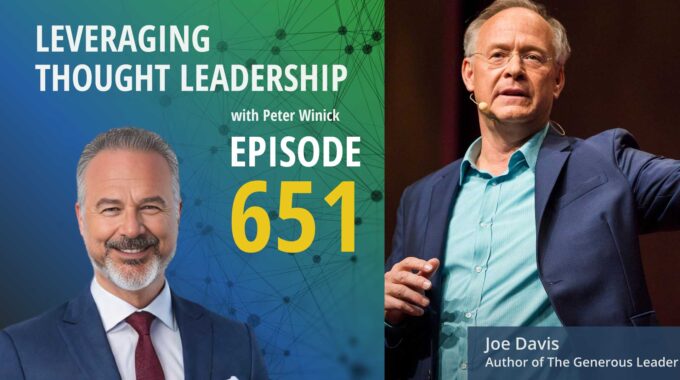Turning frameworks into funding: The hard truth about scaling thought leadership. This episode explores how…
Courage in Thought Leadership | CB Bowman
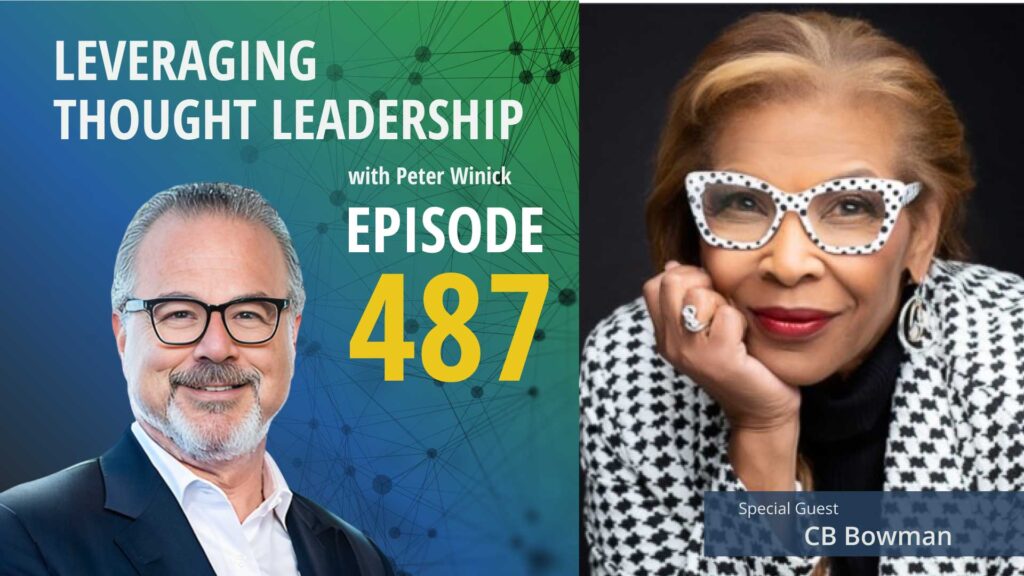
Having the courage to change lanes and modalities when needed.
An interview with CB Bowman about realizing the strength of courage, and building a new business.
Leaders often think about their legacy, from how they will build it to how it will change the industry for the better.
But if others are critical of your great works – when should you consider changing lanes?
Today we are joined by CB Bowman, the CEO of Courage Consulting, keynote speaker, host of the podcast Courage to Leap & Lead and now author of Courage to Leap & to Lead: A Roadmap for Redefining Failure into Success.
Having a business, podcast, and book with the word Courage in the title would make you think that CB has spent her career following that path – but that simply isn’t true! It was only after a conversation with Marshall Goldsmith and other thought leaders that she came to realize everything she had accomplished in her career was due to courage – her own!
Courage to Leap & Lead is CB’s first solo book authorship, and it’s been incredibly well-received. CB shares how others told her that she was courageous, leading her to consider the major events in her life and ask herself, “How did I get here?” By answering that question, she was able to break down her strategies into a teachable 7-step process.
If you are not sure about the legacy you’re building, or you can’t find focus among your ideas, this conversation might give you the courage to make a powerful change!
Three Key Takeaways:
- A thought leader must be able to pivot, build on their ideas, and recognize the strengths and challenges of their approach.
- If you identify with a concept – such as courage – then you need to live with deep respect and adherence to your teachings.
- Sometimes, the key to getting the answers you need is to ask the right question
If you need a strategy to bring your thought leadership to market, Thought Leadership Leverage can assist you! Contact us for more information. In addition, we can help you implement marketing, research, and sales. Let us help you so you can devote yourself to what you do best.

Transcript
Peter Winick And welcome, welcome, welcome. This is Peter Winick. I’m the founder and CEO at Thought Leadership Leverage and you’re joining us on the LinkedIn live version of our podcast, which is Leveraging Thought Leadership. And today my guest is Kirby Baumann, an old friend. She is a speaker, an author, a consultant, a coach and an all-around fascinating woman. So without further ado, welcome. How are you today?
C.B. Bowman Thank you. Thank you so much for having me on. Yeah, I’m a, you know, Renaissance woman doing it all.
Peter Winick So you’ve been in this thought leadership universe for quite some time. Right. Give me a sense of what you’ve seen over the last. I don’t know. Not just Kobe, but the last several years. That’s different. That’s interesting. That’s. That’s noteworthy.
C.B. Bowman Well, now, listen, I can go way back because of my age, but I can talk to you about Zoom. I can talk to you about like.
Peter Winick I didn’t say that your first book came out, as you know, on a 78 LP or something. I didn’t go there. What? What have you seen that changed? It evolved over the last several years for.
C.B. Bowman You know what, most of the change I’ve seen happen because of COVID. There are two major incidents. Well, maybe five because you have the five pandemics that that hit us like set this into a black hole. Right. So we had social justice. All right. But the killing of Floyd, we had COVID that locked us in. Right. And that allowed Zoom to be pushed out. We had economics walking into the stores and seeing an empty shelf like on – like in Cuba. What else did we have? And we had environment. Did I name, all five?
Peter Winick I think that might be four.
C.B. Bowman Well, close to close. I can’t remember the fifth one because I’m on the show now, but I’ve seen the most change since that collision of everything together.
Peter Winick Right.
C.B. Bowman Yeah, I think that. Well, I was going to say the top two. Are Floyd, which triggered social justice reform, but which leveled the playing field for all of us.
Peter Winick All right, so if you’re a thought leader, get about your domain area of expertise, because that varies amongst everybody. Mm hmm. What do you do with that? Right. So how do you. Because at the end of the day, as a thought leader, you need to connect your ideas to the people that matter most to you. Right. That’s kind of the universe.
C.B. Bowman And you know what? Yes or no? So as a thought leader, to me, a true definition of a thought leader is somebody who can. Right. If you stay in your own lane. To me, that’s an expert, but it’s not a thought leader.
Peter Winick To me you about that when you say stay in your lane, do you mean. Topic or modality?
C.B. Bowman Topic.
Peter Winick Okay. And I would politely push back a little on that. I think that it’s important once you’ve got. Let’s go.
C.B. Bowman Let’s go. Let’s go. Right.
Peter Winick Well, I think now there are exceptions. You know, Dan Pink is an exception. Malcolm Gladwell’s an exception. Seth Goden is an exception. But I think most thought leaders do best when they kind of stay in their lane. Right. They have their expertise, could be leadership, agility, resilience, whatever. And the fluidity comes in the modalities and the way they reach their audience. But let’s disagree. That’s fun too. Yeah.
C.B. Bowman So it depends upon I think the variation is how we define staying in their own lane. So if we take Malcolm, who is an expert in all things interesting, right? If COVID hits, he’s going to shift to talk about the effects of COVID in relationship to society, in relationship to economics. You know, he has that ability to pivot. That’s because his name is so well known that we will just, you know, inhale anything he puts on paper.
Peter Winick Right, Right. Okay.
C.B. Bowman Okay. Now, if I take, for example. Well, sure. Goldsmith, who we both know, he’s a thought leader in the leadership field, but if you really listen to him, this sense thesis, he doesn’t touch government and politics.
Peter Winick Well, not true, but. But he has always stayed in the leadership space. He doesn’t there’s lots of things he doesn’t he’s not a communications expert. He’s not you know, there’s a long list of things that he does not claim expertise in. And I think at the end.
C.B. Bowman He doesn’t claim it, doesn’t claim it. But if you think about it, he in a way, he still owns the space and communication is a good one. Coaching is another one, right? He doesn’t claim it, but other people assign it to him.
Peter Winick Right? Right. Well, I think even the communication piece, I agree with that from the context of he’ll talk about communication through the lens of leadership, not his you know, he’s not a presentation skills guy or how to write your best presentation.
C.B. Bowman Would you not agree with me that Marcia Goldsmith is one of the best marketeers you’ve ever met?
Peter Winick Yeah, 100%.
C.B. Bowman But he’s not for leadership.
Peter Winick Right? That was not him there. But he’s the product that he’s marketed is Leadership development, Leadership Solutions, Executive coaching. What he markets? Oh, no, no, no, no, no.
C.B. Bowman No, no he markets Marshall Goldsmith.
Peter Winick Okay. But that that to some degree is synonymous with leadership right Yeah so interesting. All right. So but let’s put this in a little bit of context. So let’s talk about how you chose to get your last book out into the marketplace as opposed to the one before that.
C.B. Bowman So this is going to be my first book that’s coming out hopefully in May. You know, the publishing industry is topsy turvy right now. The work that I did before was always a chapter in somebody else’s.
Peter Winick Okay, so you Asians, and now you’re going solo.
C.B. Bowman I’m going. I’m flying solo. Yeah.
Peter Winick Diana Ross.
C.B. Bowman You got Diana Ross, right?
Peter Winick Laters.
C.B. Bowman Yeah. And it all came about because of Marshall. So it’s. This is a great story. I was in a meeting with him, and he said to me, Stevie, what do you want to be known for? And I said, Come on, Marshall. The CEO of the Association of Corporate Executive Coaches and Marshall, he disagrees with you. He has this famous thing he does. And that’s what I got in front of a lot of people. And I said, well, what is this man crazy? He didn’t he’s not going to get in my head and tell me what I should be focusing on. But after the call, his words kept coming back to me and I kept pushing them away. And we had this I had this tablet going on. Soon after that, a member of my coaching association called me and said, KBE, I’d like for you to be a keynote speaker. And I said, Anything you remember, whatever you want. And I said, Do you want me to speak about coaching? And she said, No. And I said, Oh, you want me to speak about D.I? And she said, No. I said, Well, what the heck do you want me to speak about? That’s those are the two things I know. And she said, I want you to talk about courage.
Peter Winick Oh, wow. Okay.
C.B. Bowman And I said, Now you want the neighbor out. And she said, No, I want you. And I said, But I don’t know anything about curtains. And she said to me, She be the most courageous person I know. And I sat down to the keyboard and I started writing the keynote and all of a sudden it was like the floods came. My fingers will go up.
Peter Winick Right. Right. Right.
C.B. Bowman Holy cow. People have been telling me this all of my life, and I always said, no, I’m not courageous either.
Peter Winick A minute. So I think this this is an interesting. Thought – thought leaders is, I identify as, right,. Like this is what I think my stuff is. But what how do others think of you? And I think, quite frankly. I could think I’m the king of Siam. It doesn’t really matter, Right? You know. But getting that understanding and tuning in and listening in to how others perceive you now, it might be good, bad or ugly.
C.B. Bowman Yes, Yes, that’s fine.
Peter Winick Now we look at that, and I think I’m thinking about looking at it from an opportunistic perspective. So if that was the first person that said, Hey, C.B., I think you’re courageous, you might say, Yeah, okay, that’s nice. But there was a pattern of multiple people expressing that thought to you. Yes. Those two not go there, ignore it, whatever. But then once you is.
C.B. Bowman Imposter syndrome all the way.
Peter Winick Yeah, right.
C.B. Bowman And I mean, I’m not talking about with in recent years. I’m talking about my entire life.
Peter Winick Right. If you’re enjoying this episode of Thought Leadership Leverage, please make sure to subscribe. If you’d like to help spread the word about our podcast, please leave a five-star review at ratethispodcast.com/ltl and share it with your friends. We’re available on Apple Podcasts and on all major listening apps as well as at Thought Leadership Leverage.com/podcast.
Peter Winick So what are you doing differently now that you’ve sort of. Accepted or had this aha or this breakthrough. Are you leaning in more to courage than some of the other things you’ve done?
C.B. Bowman You know what? When I wrote the book, I said, You don’t want to write a boring story and you don’t want to do a tell all. So what? What’s the deal here? And I said, Yeah. And I thought about each of the major events in my life where people said I was courageous. And then I said, Well, how did I get there? So I’m a graduate of the New School for Social Research, and my philosophy is the answer is in the question.
Peter Winick Right.
C.B. Bowman And so and I also think the answer is the beginning of the question, right? So I said, All right. If you were courageous in these acts and you can now admit it, what process did you go through and did you continue to use that same process?
Peter Winick So they right there a moment, because I think that is the million dollar answer. And what do I mean by that? Right. So there are people that have done amazing things in the universe and will continue to do amazing things in the universe. But they’re not teachable. Right. You know, when you’re out there on the speaking circuit, you want to hear the latest Super Bowl winner or the latest, you know, gold medalist. And not to diminish the hard work and the effort, the abilities that they have. I could listen to gold medalists in ice skating all day, every day. It’s not going to do anything for me. I could learn about their grit. I can learn about their resilience, blah, blah, blah, blah, blah. It’s not going to make me a gold medal. Ice skater. I know. I disappointed, right? But I thought that you realize the question that you asked yourself is, wait a minute, is there a process, a methodology, a system that I can break down into teachable components to others? That’s the magic. Yes, That’s really the turbo boost. There’s the rocket.
C.B. Bowman Yes. I did some strategic thinking.
Peter Winick Yes.
C.B. Bowman And broke it down. And I looked at the work that Bennett said. So happy that she does all the work on courage. But what I realized is she, like others, didn’t tell me how right wages. And I needed to tell people how and I needed to tell them by example that was humorous, that was heartfelt, and then put together a formula. You know, algebra X plus Y equals.
Peter Winick Yeah.
C.B. Bowman And so I created this seven-step process and I looked at and I said, Okay, does that apply to each of the situations that you were courageous about? And well, I did.
Peter Winick So it’s interesting that there’s lots of ways to create things. It could be based on research, it could be on academia, based on hypotheses, it could be based on storytelling, etc. You sort of forensically went backwards. So you came up with the seven steps and then you pressure tested it backwards? Yes. Now, at the moment in time that you were doing these courageous things, you didn’t consciously say, and the next step is step three. The next step is step four. It was just either intuitive or in your DNA, whatever.
C.B. Bowman It wasn’t, but it wasn’t. I was actually using these steps and I didn’t really.
Peter Winick Mean using them as my question.
C.B. Bowman I’m sorry.
Peter Winick Did you know at the time that. No. No, I didn’t. I didn’t.
C.B. Bowman Yes, exactly.
Peter Winick The discovery was, wow. The commonality between these disparate things that I never thought had anything in common was I was doing something. So when we do this type of work with our clients, we’re trying to get what lives between their ears out and have others examine it, look at it and say, actually, it’s not a bunch of random things. You’ve done things in a certain way and you’re not even aware that you’ve done it in this way. Now, once we reach that, now, you can teach this to dozens, hundreds, thousands, millions of others.
C.B. Bowman Exactly. Exactly. And it made me aware of my courageousness. Right. And now when I go west, when I go off track, I have to help myself accountable. And that is painful. Very.
Peter Winick Stay there for a minute, because that’s the other thing is, is that once you put out into the world what your thing is, you become, you’re on, right? You’re the poster child for that. Now, you’re probably moments in your life if you’re human and I know that you are where you might be less than courageous or Oh.
C.B. Bowman I got called out by Marshall Goldsmith this week.
Peter Winick Okay.
C.B. Bowman I called him up and I said, Marshall, I don’t think I’m going to apply for this, think it’s 50 thing and I don’t stand a chance in hell. Why spend the time right? And he said to me, Well, see me. You’re applying for the 50 greatest thinkers, four coaches, aren’t you?
Peter Winick Right.
C.B. Bowman And I chose my words very carefully. I said, Well, I wasn’t planning on going to London, which is where it happened.
Peter Winick Yep.
C.B. Bowman And he said, Well, see me, you are applying for it, right? You’ve won it already. And I said, Yes, of course. And I said, okay. And he said, In and not applying for the big thinkers 50 as a leader, why wouldn’t you do that? And I said, Because look at all the people around me.
Peter Winick Right?
C.B. Bowman You know, I’m not doing great things, community. I’m doing great things for leaders and companies. And he said, So your focus is on courage. Would applying to this be a courageous act? Oh, I.
Peter Winick Know.
C.B. Bowman We’ll get you. He dropped the mic and he started laughing hysterically. I said, Marshall, thank you very much. I’ll be talking to you soon.
Peter Winick My version of that similar trick is in the work that I do with clients is every now and then, maybe more frequently than I’d like to admit, I might have to say to someone, Have you read your book? Or if I’m feeling a little more obnoxious, I might actually ship them a copy of their book. But I know the author well. No, and I think you would appreciate reading this book. That’s also a reason that we lean into certain topics. So I want to be mindful of the times and you got to go on a couple of minutes. This has been awesome as always. Love talking with you in the minute or two that we have left any. No pressure but courageous words of wisdom you would have for thought leaders that are maybe a couple of years behind you and sort of forging their path.
C.B. Bowman Listen to people without a fear. Figure out your lane.
Peter Winick Yep.
C.B. Bowman And don’t be afraid to close that lane down and move into a new one.
Peter Winick Love it. Thank you so much. And I appreciate you and all you do. Thank you.
C.B. Bowman Thank you so much for inviting me. I’m going to come back. I’m self inviting.
Peter Winick Come on back. There you go. That was a courageous thing. Come on back. Thank you. Thanks so much.
C.B. Bowman Thank you. Bye now.
Peter Winick To learn more about Thought Leadership Leverage, please visit our website at ThoughtLeadershipLeverage.com to reach me directly. Feel free to email me at Peter at ThoughtLeadershipLeverage.com and please subscribe to Leveraging Thought Leadership on iTunes or your favorite podcast app to get your weekly episode automatically.


